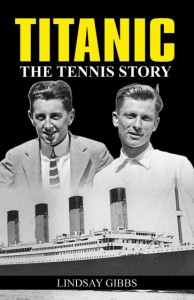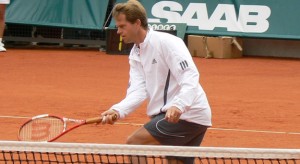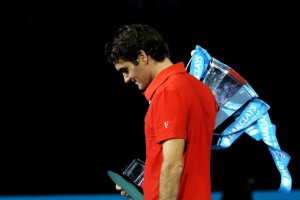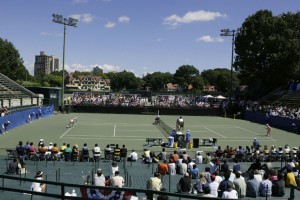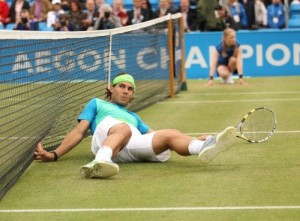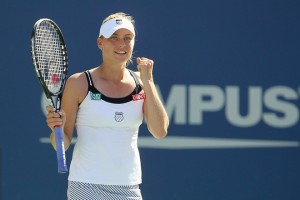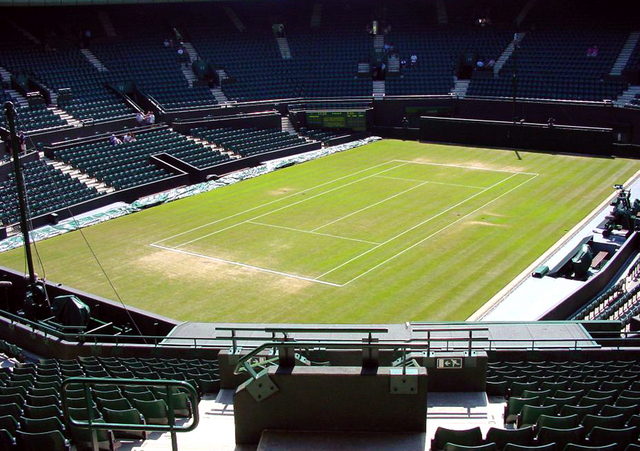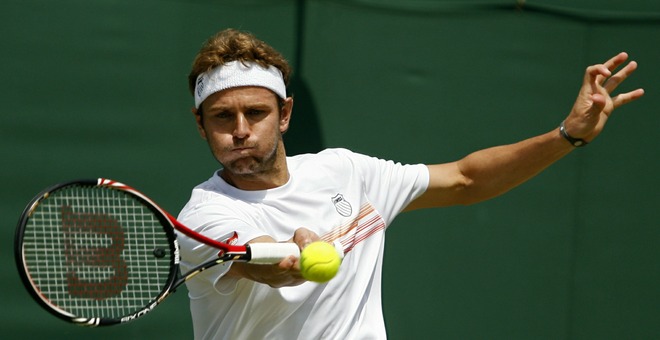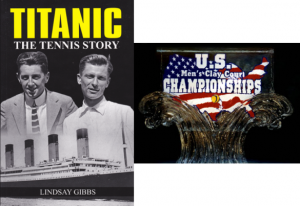 Only weeks after surviving the sinking of the RMS Titanic, nearly having his legs amputated after surviving a night in the ice cold waters by hanging onto a collapsed lifeboat, Dick Williams experienced immediate success on the tennis court. One hundred years ago, Williams, a future U.S. singles champion, U.S. Davis Cup hero and champion and Wimbledon doubles finalist, played – and won – his first three tennis tournaments in the United States just weeks after surviving one of the most famous tragedies of the 20th Century. His second singles championship during this stretch came at the U.S. Men’s Clay Court Championships, the same tournament that concludes this weekend in Houston, Texas. The following is the narrative of the initial post-Titanic triumphs of Williams from the book TITANIC: THE TENNIS STORY by Lindsay Gibbs ($12.95, New Chapter Press, available here: http://www.barnesandnoble.com/
Only weeks after surviving the sinking of the RMS Titanic, nearly having his legs amputated after surviving a night in the ice cold waters by hanging onto a collapsed lifeboat, Dick Williams experienced immediate success on the tennis court. One hundred years ago, Williams, a future U.S. singles champion, U.S. Davis Cup hero and champion and Wimbledon doubles finalist, played – and won – his first three tennis tournaments in the United States just weeks after surviving one of the most famous tragedies of the 20th Century. His second singles championship during this stretch came at the U.S. Men’s Clay Court Championships, the same tournament that concludes this weekend in Houston, Texas. The following is the narrative of the initial post-Titanic triumphs of Williams from the book TITANIC: THE TENNIS STORY by Lindsay Gibbs ($12.95, New Chapter Press, available here: http://www.barnesandnoble.com/
***
On June 2, only six weeks after being told that his legs needed to be amputated, he competed in his very first tennis tournament in America: the Pennsylvania State Championships at the Philadelphia Cricket Club. He was a complete unknown to the other players in the field. In the locker room, he was surrounded by men who had many pages devoted to them in moleskin notebooks, now resting at the bottom of the Atlantic Ocean. Dick was a little bit star-struck to be in their presence. He kept to himself, quietly watching where the others put their gear in the locker room and where to go for practice and for meals. He wished that Karl were there to show him around, like they had talked about on the Carpathia.
To even get into the tournament, Dick had to play a preliminary round, against one W.H. Trotter, a man he knew nothing about but who looked to be pushing forty and quite comfortable with the prospect of playing an unknown kid from Switzerland in the first match. They contested their match on the sprawling lawn right in front of the clubhouse. Other matches were going on beside them and nobody was watching as Dick won 6-1, 6-1 in about thirty minutes. He also easily defeated his next three opponents: a Philadelphia millionaire named Craig Biddle, former intercollegiate doubles champ Allen Thayer, who he was happy to learn was not related to John and Jack, and the promising nineteen-year-old local boy William Tilden, Jr. Dick didn’t even drop a set.
He made it to the final where he was to meet Wallace F. Johnson in a best-of–five-set match. The winner would play the 1911 Pennsylvania State champion Percy Siverd in the Challenge Round for the title. Wallace Johnson was the 1909 intercollegiate singles and doubles champion from the University of Pennsylvania and a fixture in the top ten in the American Lawn Tennis rankings for years. Dick knew all about him – there were numerous moleskin pages devoted to him. This would be the biggest test of his rejuvenated legs. His body was beginning to ache as the consecutive matches began to take their toll. He was concerned about his stamina.
Before the match, he found a surprise guest waiting for him outside the locker room – Jack Thayer. As he walked toward his old friend, who stood there beaming from ear to ear, he found himself tensing up. Memories came rushing over him, memories he had been suppressing. He just wanted to focus on the match.
“What are you doing here?” he blurted out, hoping he didn’t sound angry.
“Dick, you’re all over the local papers. I can’t believe it. It’s just like your dad said. You’re going to be a star!” Jack said excitedly. Dick forced a smile, but he really just wanted to be alone in the locker room to prepare for his match.
“Well, thanks for coming.,” he said, wishing that he meant it.
“Of course. I’m glad you’re doing so well, Dick. It’s amazing
Jack’s voice sounded much more mature than Dick remembered. He took a good look at Jack, suddenly realizing how much older he looked and acted. There were dark circles underneath his eyes and no sparkle behind them like there used to be. Dick felt guilty.
“Are you okay?” he asked, though he was afraid of the answer.
“Yeah, I’m okay. It’s just been − well, you know…” Jack faded off.
“Yeah. I know.” He hoped he sounded sincere.
But he didn’t know. He had been so engrossed with tennis that the horror they’d been through felt like a lifetime ago. He knew that there were reasons to be sad, and he certainly hadn’t forgotten the loss of his father, but he was honoring his father by devoting himself to his sport.
A large crowd gathered for the final. Word around Philadelphia quickly spread about this kid from Geneva who was running through the tournament like wildfire. And Dick was having so much fun on the tennis court that for the first time in his life he didn’t mind playing in front of a crowd. In Switzerland, he always wished the people would go away and stop looking at him, but here he relished it.
He won the first two sets against Johnson with ease 6-0, 6-1, but in the third set he found fatigue catching up with him. He knew that if he lost the third set, he would be in for a fight and would be in trouble.
At 5-5 in the third set, with the crowd eager to see more tennis and urging on the well-known champion Johnson, Dick looked up and saw Jack in the crowd cheering him on. Suddenly he thought of the swim, the cold, the pain. He thought about the hours spent holding onto that lifeboat, the people who didn’t make it, the hours of walking and fighting he had been through on the Carpathia to get him to this moment. He fought through all of that. He made it through the unimaginable. He could win this tennis match.
He anticipated Johnson’s serve out wide and took the ball almost immediately after it bounced and drove it hard down the line, not giving Johnson a chance to react. This gave him a break point, and after getting a good return in play, he was able to come to net and connect with a high volley that was angled so far away from Johnson that he didn’t have a chance. Dick broke serve to go up 6-5.
The crowd rose to their feet with applause, so impressed by Dick’s level of play that they momentarily forgot that they had been rooting for Johnson to extend the match. They had never seen tennis played like this before – so carefree and aggressive. It seemed to come so easy to him. Dick smiled on court, soaked in the applause and let the adoration re-energize his legs. He tried to keep his mind focused. Looking across the net, he could already tell that his opponent was defeated. All he had to do was get a few solid serves in play to seal the victory. Johnson’s shoulders were slumped and his eyes were darting around, clearly distracted by the crowd’s excitement. Four points later, Dick hit his last un-returnable shot and walked to the net to shake Johnson’s hand. After this victory, he felt like he could do anything in tennis.
The next day, Dick went on to beat defending champion Siverd 6-1, 6-1, 6-1 to win the Pennsylvania State Championships. His body was exhausted, but the match didn’t last any longer than a practice set would have, so it didn’t matter. Siverd had nothing to challenge Dick’s game.
One tournament. One trophy. No sets lost. It was a debut unlike any tennis player had ever had on American soil.
And he was far from done. He wanted to keep playing and to keep winning. He won the U.S. national mixed doubles championship with Mary K. Browne at the Cricket Club the following week and then was invited to play the prestigious U.S. Clay Court Championships in Pittsburgh at the end of the month. With a skip in his step and some unrecognizable swagger in his stride, he sought out some clay courts nearby and began to prepare for his second singles tournament.
At the Penn States, Dick had been an invisible unknown in the locker room, but when he got to Pittsburgh, things had changed. There was a buzz everywhere he went. He could feel that other players were talking about him, inspecting him. Still, he remained calm and determined.
The human mind has an amazing ability to compartmentalize feelings and memories. In those days, Dick rarely let himself think about the Titanic and he never talked about it. He wanted to move on. He was building a new life for himself. But when he was on the tennis court, when he was playing those matches and steamrolling through opponents, he felt closer to his father than he ever had in his life. He didn’t have to think about him or talk about him or cry for him. He was playing for him.
At the Clay Court Championships, he breezed through the first three matches with identical scores – 6-0, 6-2. By the time he reached the quarterfinals, the galleries for his matches were jam-packed, with little boys being placed on their father’s shoulders to catch a glimpse of this unheralded kid. With each serve he felt more in control of his life. With each volley he felt more alive. With each win he felt more and more confident.
In the all-comers final, he met the defending national doubles champion Gustave Touchard. Dick smiled his way through the match, charming the crowd and infuriating Touchard, who was left defenseless against Dick’s aggressive onslaught. He beat Touchard in straight sets and continued his winning streak in the Challenge Round, unseating the defending champion Walter T. Hayes 6-3, 6-1, 8-6.
Pennsylvania State Champion. United States Clay Court Champion. No sets lost in America. Former champions dismissed like so many schoolboy players. What had once seemed impossible now was within his grasp. Maybe, just maybe, he was as good as his father thought he was. Maybe those dreams weren’t so far-fetched after all.
“He could be the next great American player,” said the pundits. “He is setting a record for fastest ascent from unranked to the top ten – it only took him two tournaments!” they marveled.
“If he keeps playing like this he might never lose.”
“He could beat the “California Comet” himself Maurice McLoughlin!”
“He might even win the Nationals this year.”
For the first time, he actually believed that he could.
TITANIC: THE TENNIS STORY is the new, much-discussed new novel by Lindsay Gibbs that tells the narrative tale of Williams and fellow tennis player Karl Behr and their incredible stories of survival from the Titanic disaster. The two tennis standouts amazingly survived the sinking and met each other on the rescue ship Carpathia. Two years later, the two became U.S. Davis Cup teammates and again faced each other in the quarterfinals in the biggest tennis tournament in the country, the U.S. Nationals – the modern-day U.S. Open. The winner went on to become the unexpected singles champion of the tournament, winning their first major singles championship with a final-round upset over the world’s best player Maurice McLoughlin – the Roger Federer of this era in tennis. Gibbs constructed the novel based on extensive historical research in newspapers, magazines and other periodicals and from historical first-person writings from the era and of survivors. She took creative license with dialogue and personalities and created certain situations in the novel, classified as a work of historical fiction. TITANIC: THE TENNIS STORY is available in print or electronic edition at your local independent bookshop,www.BarnesandNoble.com, www.indiebound.org, iTunes, Kobo, and elsewhere. It is not currently available in a Kindle edition.

